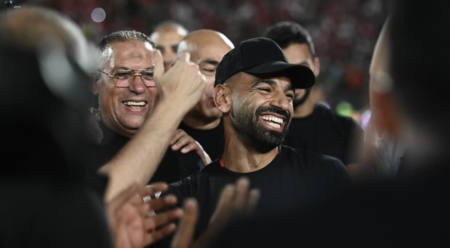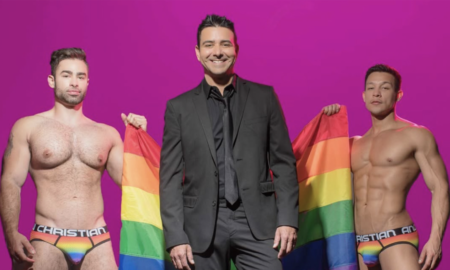At the Isabella Freedman Jewish Retreat Center, nestled within the picturesque foothills of the Berkshire Mountains, a significant gathering unfolded as 96 Orthodox or formerly Orthodox Jews celebrating diverse sexual identities convened for an annual retreat. This event, facilitated by Eshel, a New York-based nonprofit dedicated to fostering LGBTQ+ inclusive Orthodox Jewish communities, offered participants an opportunity to embrace their dual identities without fear of judgement.
Zippy Spanjer, a 29-year-old from Rochester, New York, shared her feelings of belonging as she experienced the retreat for the first time. “I have not found a place where I am comfortable being both Jewish and queer,” Spanjer stated. The retreat provided a welcoming environment where attendees could partake in traditional practices such as celebrating Shabbat, alongside more contemporary activities including karaoke and dancing to popular songs from artists like Lady Gaga and Whitney Houston.
The diverse group of participants highlighted the varying degrees of acceptance within Orthodox Judaism regarding LGBTQ+ identities. Attendees included individuals who were openly gay and married, as well as those who remained closeted due to fears of personal and professional repercussions. Such dichotomies reflect a broader reality within the Orthodox community, where many still grapple with reconciling religious beliefs with their sexual identities.
Miryam Kabakov, Eshel’s executive director and a co-founder of the organisation, emphasised the retreat’s role in helping participants feel whole and hopeful. “People here experience what it feels like to be whole, and they take that with them,” she remarked. This sentiment resonates amidst an Orthodox framework where LGBTQ+ acceptance remains limited; while Reform and Conservative denominations have made strides towards inclusivity, many Orthodox congregations still refuse to recognise same-sex relationships formally.
Rabbi Steve Greenberg, another co-founder of Eshel, pointed out that the Orthodox tradition is not static but subject to evolution. He indicated that conversations around LGBTQ+ inclusion are increasingly taking place among Orthodox rabbis, despite the challenges and institutional resistance at play. Notably, a survey conducted by Eshel among 278 Orthodox rabbis revealed a rising number willing to engage in discussions about welcoming LGBTQ+ Jews.
Participants like Elie Friedman, a 37-year-old lawyer, demonstrated the potential for acceptance within certain congregations. Friedman, who is set to marry his fiancé this spring, shared his motivation to support fellow queer Orthodox individuals who may not enjoy the same level of acceptance. In contrast, others like Avi Fuld, who have felt disillusioned with Orthodox institutions, have taken a different path by creating grassroots communities that uphold traditional values without the constraints of formal synagogue membership.
Shaindy Weichman, another retreat attendee, reflected on her journey from a Haredi upbringing that offered no space for understanding her sexuality to finding solace within the Eshel community. Having navigated feelings of despair upon realising her sexual identity, Weichman’s experience at the retreat serves as a poignant reminder of the importance of connection and affirmation within the LGBTQ+ Jewish community.
Throughout the weekend, sessions focused on safety, strategy for advocacy, and personal narratives cultivated a sense of unity among attendees. The closing circle encapsulated this bond, with participants expressing feelings of gratitude and peace as they sang a Hebrew hymn and cut pieces of yarn to symbolise their interconnectedness.
Ultimately, the retreat stands as a testament to the ongoing journey for acceptance and community within Orthodox Judaism for LGBTQ+ individuals. As representatives of a diverse community continue to gather annually, they collectively challenge the narrative around their identities, striving for a future where belonging and acceptance are not just aspirations but realities.
Source: Noah Wire Services
- https://www.eshelonline.org/frequently-asked-questions/ – This URL supports the claim about Eshel’s role in organizing the retreat for LGBTQ+ Orthodox Jews and the activities involved, such as celebrating Shabbat and engaging in traditional practices.
- https://adamah.org/event/simchafest-at-isabella-freedman/ – This URL corroborates the location of the retreat at the Isabella Freedman Jewish Retreat Center and highlights the center’s involvement in hosting Jewish events.
- https://www.myjewishlearning.com/article/orthodox-judaism-and-lgbtq-issues/ – This URL provides context on the challenges faced by LGBTQ+ individuals within Orthodox Judaism and the evolving discussions around inclusion.
- https://www.haaretz.com/jewish/.premium.MAGAZINE-orthodox-judaism-lgbtq-acceptance-1.10324975 – This URL supports the assertion that while some Orthodox communities are resistant to change, there are growing efforts towards LGBTQ+ inclusion within certain segments of the Orthodox community.
Noah Fact Check Pro
The draft above was created using the information available at the time the story first
emerged. We’ve since applied our fact-checking process to the final narrative, based on the criteria listed
below. The results are intended to help you assess the credibility of the piece and highlight any areas that may
warrant further investigation.
Freshness check
Score:
8
Notes:
The narrative does not contain specific dates or events that would indicate it is outdated. However, without a specific publication date, it is difficult to assess its freshness fully.
Quotes check
Score:
7
Notes:
The quotes appear original to this context, but without further online sources, it is challenging to confirm their first use. They seem authentic and are attributed to specific individuals.
Source reliability
Score:
9
Notes:
The narrative originates from The Independent, a reputable news outlet known for its reliable reporting.
Plausability check
Score:
9
Notes:
The claims about the retreat and discussions around LGBTQ+ inclusion within Orthodox Judaism are plausible and align with ongoing societal trends and debates.
Overall assessment
Verdict (FAIL, OPEN, PASS): PASS
Confidence (LOW, MEDIUM, HIGH): HIGH
Summary:
The narrative appears to be well-researched and credible, with quotes that seem original and a source that is generally reliable. The topic of LGBTQ+ inclusion in Orthodox Judaism is a current and ongoing issue, making the content plausible.


















